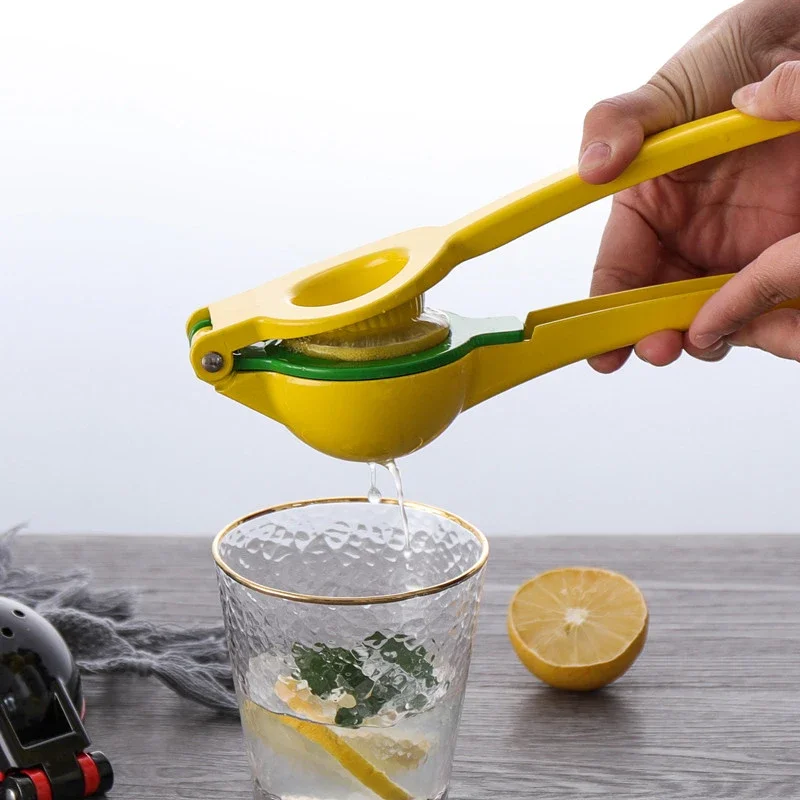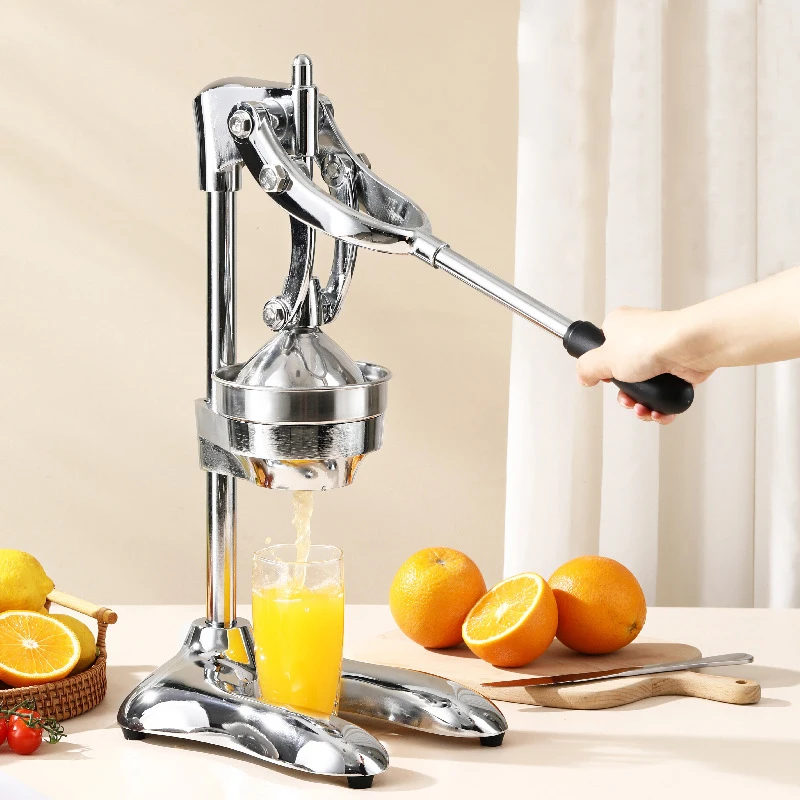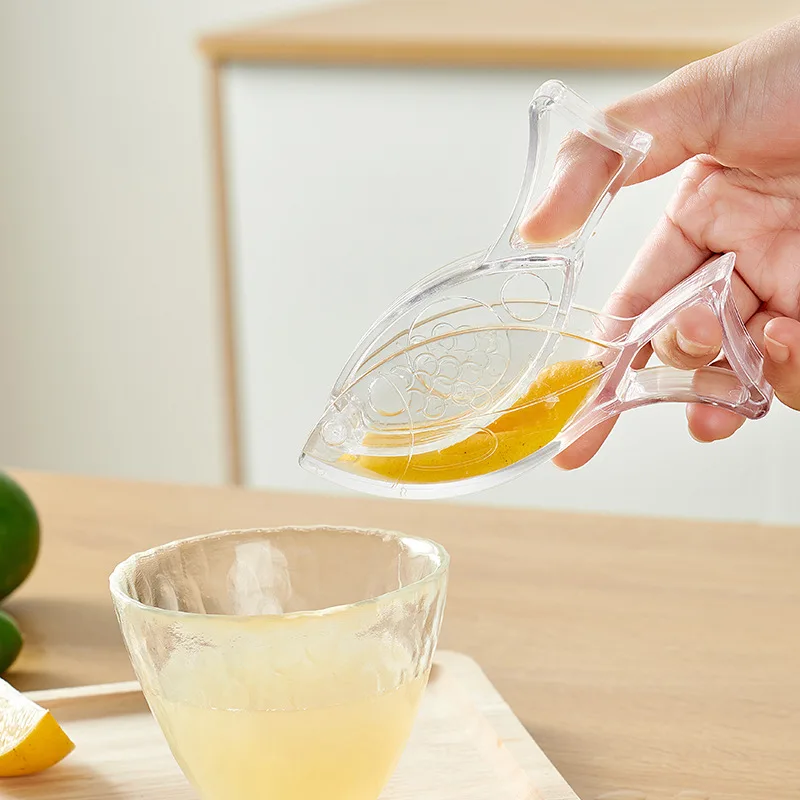Types of Lemon Juicers
Choosing the right type of lemon juicer can enhance your juicing experience. There are mainly two types – manual and electric.

Manual Citrus Juicers
Manual juicers are ideal for quick tasks and small batches. They require some elbow grease but are simple to use and usually more affordable. You can find handheld squeezers, which are great for lemons and limes, and countertop presses, which work well with bigger citrus fruits too.
Handheld squeezers are lightweight, easy to store, and keep your hands clean. They are perfect for those who juice occasionally. Countertop presses offer more leverage and are better for juicing large quantities. However, they can take up more space in your kitchen.
Electric Citrus Juicers
Electric juicers are best if you need to juice large amounts of lemons. They work quickly and with less effort. Most have a reamer that spins to extract juice while pressing down on the fruit. They often come with features like multiple pulp settings and built-in strainers.
Electric juicers take up more counter space and can be more expensive. They are suitable for those who value convenience and regularly drink fresh citrus juices. Cleaning can be a bit more complex as they usually have more parts than manual juicers.
In summary, manual juicers are affordable and simple, while electric juicers offer speed and convenience. Your choice depends on your juicing habits, budget, and kitchen space.
Key Features to Consider in a Lemon Juicer
When shopping for a lemon juicer, several features will guide your decision. Pay attention to ease of use, juice yield, size, and cleaning options.
Ease of Use and Ergonomic Design
Look for juicers with comfortable grips and straightforward mechanisms. They should not strain your hands or wrists. Juicers with an ergonomic design allow for smooth operation and minimal effort during the juicing process.
Juice Yield and Efficiency
A good lemon juicer should extract maximum juice with little waste. Efficient juicers leave dry pulp, indicating thorough juice extraction. Assess the juicer’s ability to handle various citrus sizes for adaptable juicing experience.
Size and Storage Options
Consider the space you have in your kitchen. Manual juicers typically have a smaller footprint than electric ones. Choose a juicer that fits comfortably in your storage space and is not too bulky on your counter.
Cleaning and Maintenance
The best lemon juicer is one that’s easy to clean. Look for models that can be easily disassembled and have dishwasher-safe parts. Regular cleaning ensures long-term effectiveness and hygiene.
 Best Manual Lemon Juicers
Best Manual Lemon Juicers
Manual lemon juicers are great for hands-on juicers. They come in various types and can be a joy to use. Most are easy to clean and store. In this section, we’ll explore the top choices among manual juicers.
Handheld Citrus Squeezers
Handheld citrus squeezers are a must-have for quick juicing tasks. They are simple, compact, and require no power. When used right, they provide a good amount of juice. Look for models like the KitchenAid Citrus Squeezer. It has a built-in strainer and a spout for easy pouring. It is also designed to rest on the counter, requiring less hand strength.
These squeezers often have comfortable grips for easier handling. Many fit nicely in kitchen drawers. They’re typically made of metal or strong plastic. And, they’re a good choice for those who want a quick, fresh squeeze without much fuss.
Countertop Citrus Presses
Countertop citrus presses are ideal for juicing lots of lemons. They give extra leverage and more juice with less effort. Heavy-duty options like the Mueller Professional Citrus Juicer can handle the task. This juicer uses a lever to press down on the fruit for maximum extraction.
These presses are larger and take up more space. But, they can be quite effective. Many are made of durable materials like cast iron or stainless steel. Some may need to be mounted for stability. They work well if you have the room and need to juice often.
When choosing either type of manual juicer, consider factors like ease of cleaning, efficiency, and comfort. The best juicer is one that matches your needs and makes juicing lemons enjoyable.
Popular Lemon Juicer Models
Finding the right lemon juicer can make all the difference in your kitchen routine. Here’s a look at some popular models that bring efficiency and convenience to your citrus juicing tasks.
Oxo Good Grips 2-in-1 Citrus Juicer
The Oxo Good Grips 2-in-1 Citrus Juicer stands out for its smart design. It features a reamer with two sizes – one for small lemons and limes and another for larger fruits like oranges and grapefruits. Its built-in measuring cup catches juice and has easy-to-read markings. The reamer also acts as a strainer, reducing pulp in your juice. Ergonomic and easy to handle, this juicer is both user-friendly and dishwasher safe.
KitchenAid Citrus Squeezer
KitchenAid is known for quality, and their Citrus Squeezer is no exception. It boasts an integrated strainer that catches seeds and pulp, making your juice smoother. The tool is designed to rest on the counter for added leverage, requiring less hand strength. This squeezer is compact, easy to clean, and perfect for those quick lemon juice needs.
Mueller Professional Citrus Juicer
For those who often juice in larger quantities, the Mueller Professional Citrus Juicer is a solid choice. This heavy-duty press uses a lever action, allowing for efficient juice extraction with minimal effort. Though larger and more suited for heavy use, it promises stability and durability. Its design ensures thorough juice extraction, leaving behind dry pulp, which points to its efficiency.
When picking a lemon juicer, consider not just the design but also its ease of cleaning, juice yield, and construction quality. These popular models cater to a range of needs, from occasional use to more frequent, high-volume juicing.
How to Maximize Juice Extract from Lemons
Getting the most juice from your lemons ensures a flavorful and zesty addition to any dish or drink. Here’s how to maximize every drop.
Tips for Selecting the Right Lemons
To start, choose lemons that are ripe and heavy for their size. These typically contain more juice. Look for lemons with thin skins as they tend to be juicier. Avoid lemons that are too firm or have thick, hard skin as they might yield less juice.
A little warmth helps. Roll lemons on the countertop before juicing to break down the cells within and release more juice. If you have time, soak them in warm water for a few minutes, or pop them in the microwave for about 20 seconds. These methods can make the lemons softer and juicier.
Techniques for Effective Juicing
Before you cut the lemon, roll it firmly against your kitchen counter. This technique loosens the inner segments, priming them for maximum juice release. When you’re ready to juice, cut the lemon lengthwise rather than in half. This exposes more surface area of the citrus, making it easier to squeeze out more juice.
Use your palms for leverage when using handheld citrus squeezers. Apply steady pressure to get every bit of juice. If using a countertop press, make sure the fruit is placed properly. Apply firm, steady pressure on the lever to extract juice efficiently.
For manual reamers and squeezers, don’t discard the lemon after the initial squeeze. Often there’s more juice to be had. Twist and turn the lemon over the reamer or give the squeezer a few more pumps. You’ll be amazed at how much extra juice you can get.
By following these tips, you’ll enhance your juicing technique and enjoy fresh lemon juice to its fullest.
 Maintaining Your Lemon Juicer
Maintaining Your Lemon Juicer
Proper maintenance keeps your lemon juicer in top shape. Here’s how to do it right.
Regular Cleaning Tips
After juicing, always rinse your juicer with warm water. This helps remove pulp and residue. For tough spots, a soft brush can get into nooks. A mix of baking soda and water can tackle stains. Handheld squeezers often need a quick wash and towel dry. Countertop presses may need parts removed for a deep clean. Check if your juicer’s parts are dishwasher safe for hassle-free cleaning.
Long-Term Care and Storage
Store your lemon juicer in a dry place to prevent rust or damage. If it’s metal, wipe it down with a bit of oil on a cloth to protect it. For juicers with extra parts, keep them together to avoid losing them. Inspect your juicer for wear. Replace parts like silicone grips or reamer tips when needed. By taking good care, your lemon juicer can last for years.
